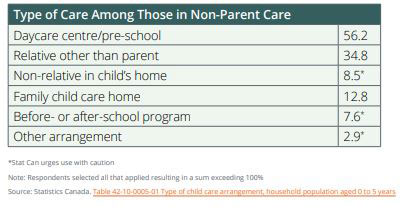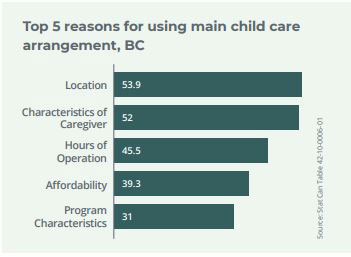New Provincial Child Care Data
Child care policies should be equitable for all families, regardless of the type of care they choose. Yet child care policy in Canada primarily directs funding towards centre-based care. The recent Statistics Canada Survey on Early Learning and Child Care Arrangements, 2019 and follow up analysis Early Learning and Child Care for Children aged 0 to 5 years: A Provincial/Territorial Portrait show that parents use a variety of arrangements, and the majority of parents receive no benefit when provinces fund centre-based care. BC should take a neutral approach that respects the diverse arrangements parents make for their children.
Non-parent child care can be expensive, and BC has committed $1.3 billion through 2021/2022 to expand child care access. Yet the recent Statistics Canada survey shows that the trajectory toward $10 per day child care focuses on expanding a type of care most BC parents do not currently choose for their children.
Principles of Equitable Child Care Policy: Diversity and Neutrality
Diversity: Parents Rely on Diverse Care Arrangements
Child care is the care of a child regardless of who provides the care. Parents rely on diverse care options for their children, and public policy should recognize and support the choices parents make for their family.
In BC, about 58 percent of children under six years old are in non-parental care. Of these, about 56 percent are in child-care centres or in a preschool program. This means that when we consider all children in BC under the age of six—those in parental care and those not—just under a third are currently in centre-based care or preschool. 1 1 Calculations by author based on Stat Can Table 42-10-0004-01 & Table 42-10-0005-01
Neutrality: Policy-Makers Must Respect Diverse Parental Needs
BC should opt for a neutral approach that respects the needs and choices of parents.
Provinces fund spaces in centre-based care in response to a perceived shortage of care. According to Statistics Canada, nearly 54 percent of BC parents who use non-parental child care report no problem finding care. Rather than funding one form of care in response to a perceived crisis, BC should take a neutral, evidence-based approach and respect the diversity of care parents choose.
Affordability is a much-discussed issue, but parents choose care based on their needs and desires. According to the survey, the top reasons parents who use non-parental care select the type of care they do are location (53.9%), the characteristics of the individual providing care (52%), and hours of operation (45.5%). Furthermore, many parents depend on in-home care or relatives, while about 42 percent of parents with children under six in BC do not currently use non-parental care.
BC parents who use funded daycare spaces receive preferential treatment. In addition to receiving a subsidized space, they can claim the federal child care income tax deduction. Meanwhile, 17 percent of children under six in BC are cared for by a stay-at-home parent who chooses to remain home with them. However, these families receive no benefits from these programs.
A Positive Vision
BC must seek maximum freedom and flexibility when negotiating bilateral agreements with the federal government so that funding can be leveraged toward equitable treatment of all families with children.
BC should fund children not spaces, maintaining neutrality toward the type of care children receive in the province. The trajectory toward $10-per-day child care does not respect the needs and choices of parents.
If BC wants to make child care more affordable, it can provide funding directly to parents. The upcoming Child Opportunity Benefit or an expansion of the Affordable Child Care Benefit are examples of more inclusive policies.
BC should renew its focus on care policies that are equitable for all families, regardless of the type of care they choose.


